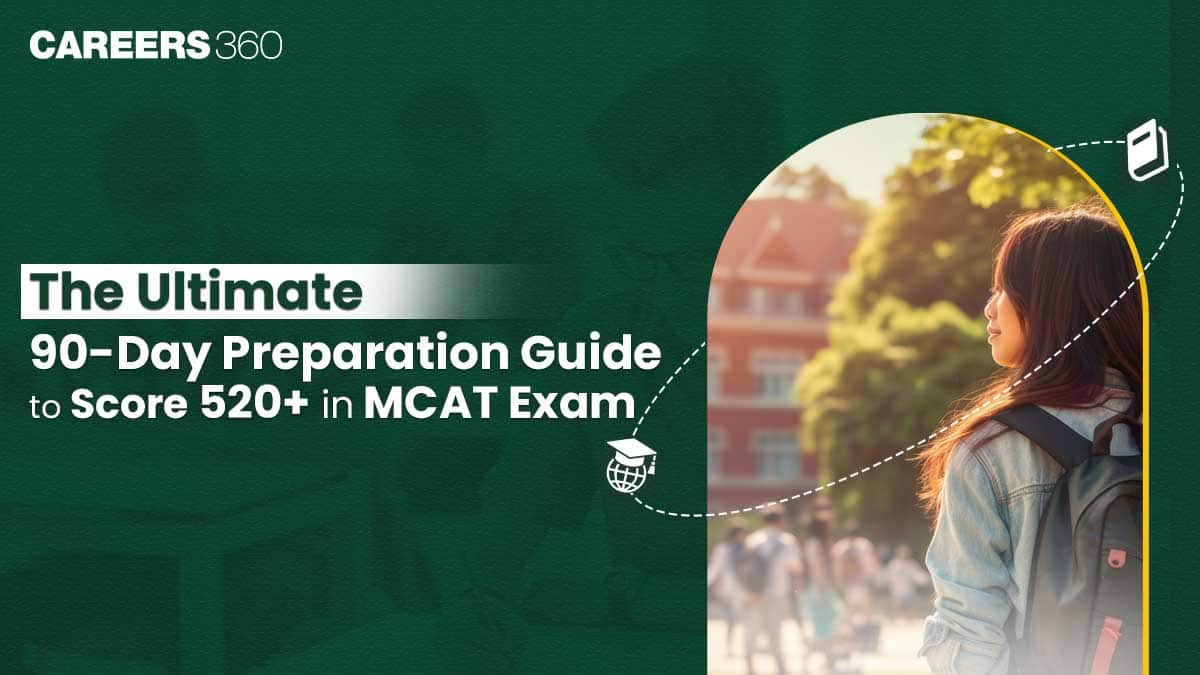The Ultimate 90-Day Preparation Guide to Score 520+ in MCAT Exam and Get Into Top Med Schools
Planning to take the MCAT in January 2026? Clearing the Medical College Admission Test (MCAT) is the first step to get admission into the best medical schools in the US, Canada, Australia, and the Caribbean. The Association of American Medical Colleges (AAMC) conducts MCAT and the exam evaluates the knowledge of candidates in scientific concepts, critical thinking and reasoning skills required in the medical profession. If you wish to take the MCAT exam in January 2026, you must begin with the preparation. This guide breaks down the study plan, tips, resources, MCAT preparation tips etc to help you score 520+ and get admission in top medical schools worldwide.
This Story also Contains
- MCAT 2026 Exam Overview
- MCAT Exam Pattern
- Why should you choose to take MCAT in January?
- How to prepare for the MCAT exam in 3 months?

Read More: MCAT exam dates
MCAT 2026 Exam Overview
Here is an overview of the MCAT exam 2026.
Exam | MCAT (Medical College Admission Test) |
Conducting Body | Association of American Medical Colleges (AAMC) |
Mode | Computer-Based Test (CBT) |
Duration | Around 7 hours 30 minutes |
Score Range | 472–528 |
Ideal Prep Time | 4–6 months (minimum 90 days focused prep) |
Next Major Attempt | January 2026 |
MCAT Exam Pattern
Here is the MCAT exam syllabus for 2026.
Section | No. of Questions | Time (Approx.) |
Biological and Biochemical Foundations of Living Systems | 59 | 95 min |
Chemical and Physical Foundations of Biological Systems | 59 | 95 min |
Psychological, Social, and Biological Foundations of Behavior | 59 | 95 min |
Critical Analysis and Reasoning Skills (CARS) | 53 | 90 min |
Why should you choose to take MCAT in January?
Here are some reasons why candidates decide to take the MCAT exam in January.
January scores arrive before major spring deadlines.
Plenty of time to reattempt later in 2026 if needed.
Ideal for students applying in the 2026–27 cycle.
Utilize the winter break for uninterrupted study sessions
Related Reads:
How to prepare for the MCAT exam in 3 months?
Follow this study plan for the next 3 months and score 520+ to get admission in the top medical schools.
Month 1: Focus on building a strong foundation
In the first month, pay attention to the core science subjects (biology, chemistry, physics, psychology, and sociology). Refer to the videos of Khan academy MCAT or Kaplan books for preparation. Appear for diagnostic tests to get an idea of your strong and weak areas. Stick to a fixed study schedule and make notes.
Month 2: Practice
Keep practicing and applying concepts to AAMC-styled questions. Track your improvement by attempting sectional tests every week. Allot some reading time for CARS-opinions, editorials, and academic texts. Refer to UWorld MCAT sample papers and AAMC question packs and pay attention to experiment analysis and data interpretation.
Month 3: Final Mock Tests & Review
Ensure to take at least 5-6 complete MCAT mock tests and sample papers to understand the exam better. Note all your mistakes and track your MCAT scores. You should focus more on high-yield exam topics for MCAT like amino acids, metabolism, reaction mechanisms, endocrine system, and experimental design. Sit for 7+ hours to get an idea of time management skills. Keep reviewing notes for the last week.
Explore More Articles:
Frequently Asked Questions (FAQs)
Getting an MCAT score of 520 is very strong and candidates securing it are placed in the 97th percentile of all MCAT test takers. So, it is very difficult to get a 520 on the MCAT.
For the majority of the students taking the MCAT exam, two months' time is not enough. Even the official prep resources of AMSA and Kaplan recommend at least 300-350 hours studying to get a good MCAT score.
If a candidate misses around five to seven questions in the MCAT exam, it would result in a score of 520 in the MCAT exam.
Popular Courses and Specializations
Popular Degrees
Popular Branches
Questions related to MCAT
On Question asked by student community
Hi, I hope you achieve success in every milestone you have set for yourself. You can use the following links
https://learn.careers360.com/medical/neet-preparation-material/
https://studyabroad.careers360.com/articles/mcat-exam-preparation-complete-prep-guide-for-indian-students-in-2026
Yes, you can appear for the MCAT (Medical College Admission Test for U.S./Canada) even after B.Tech in Biotechnology from India. However, note:
MCAT is primarily for entry into medical schools abroad.
You’ll still need prerequisite coursework and apply through recognized medical schools.
To pursue medicine in India, you’ll need to
Hi rachna
Pursuing medical studies or MBBS in the USA or Australia can be a bit complex, but I'll break down the steps for you:
USA:
1. *Undergraduate degree*: Complete a bachelor's degree in a science-related field (e.g., biology, chemistry, or physics) from an accredited US institution.
2. *MCAT*: Take
The MCAT exam is not conducted in India. Indian students must travel to nearby countries like Thailand (Bangkok), Qatar (Doha), Malaysia (Kuala Lumpur), or Singapore to take the test.
Yes, you can give the MCAT exam even if you have a Bachelor of Homeopathic Medicine and Surgery (BHMS) degree. The MCAT is a standardized test used for admission to medical schools in the United States and Canada.
However, while a good MCAT score can be a significant factor in
Applications for Admissions are open.
Apply for UG & PG programs from Victoria University, Delhi NCR Campus
Study in Ireland
ApplyWant to study in Ireland? Explore Universities & Courses
Study in Canada
ApplyExplore Universities, Courses & Subjects | Work while study
Study in UK
ApplyApply for upcoming intake & plan your journey
Study in USA
ApplyUniversities inviting applications | Get expert guidance
Study in Australia
ApplyShortlist best ranked universities & get expert guidance
